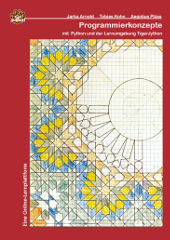Planetensortieren [Java] (Algorithmen)
Von einer Idee von Michael Weiß stammt die folgende Aufgabe.
Laden Sie die Datei „planetensortieren.zip“ herunter und
packe die Datei aus (unzip).
Ziel ist es, im Programmcode Sortierer
(src/ch/programmieraufgaben/planetensortieren/controller/Sortierer.java) eigene
Sortieralgorithmen einzubauen.
Öffnen Sie die Datei aufgabentext/Dokumentation.pdf und halten Sie sich an das dort beschriebene
"Vorgehen".
Zunächst soll der BubbleSort (ein Standard-Sortierverfahren) eingebaut werden. Danach kann der Algorithmus verbessert
werden (Merge-Sort, Heap-Sort, Insertion-Sort, …).
Dateien:
0 Kommentare
9 Lösung(en)
@Sort
public void bubbleSort() {
while(! istSortiert()) {
int actPos = getFirstSortPos();
while(actPos <= getLastSortPos() - 1) {
if(! istKleiner(actPos, actPos + 1)) {
tausche(actPos, actPos + 1);
}
actPos = actPos + 1;
}
}
}
@Sort
public void quickSort() {
quickSortRekursiv(getFirstSortPos(), getLastSortPos()); }
private void quickSortRekursiv(int firstSortPos, int lastSortPos) {
// Rekursionsabbruch:
if(firstSortPos >= lastSortPos) { return; }
//Rekursion vorbereiten (Daten segmentieren)
int pivot = quicksort_partitionierung(firstSortPos, lastSortPos);
//sort rekursiv
quickSortRekursiv(firstSortPos, pivot - 1);
quickSortRekursiv(pivot + 1, lastSortPos) ; }
// Partitiorierung im Quicksort.
// Der Array sieht wie folgt aus:
// k k k <pivot> g g g k u
// [0] .. [pivot] [pivot + 1] ... [i]
// k = kleiner als [pivot]
// g = größer als [pivot]
// u = noch unbekannt.
private int quicksort_partitionierung(int firstSortPos, int lastSortPos) {
int pivot = firstSortPos;
int i = pivot + 1;
while(i <= lastSortPos){
if(! istKleiner(pivot, i)) {
tausche(i, pivot);
if(i > pivot + 1) {
tausche(pivot + 1, i); }
pivot = pivot + 1; }
i =i + 1; }
return pivot; }
/**
* Gressly (2009)
* Teste, ob sortiert.
* Falls nicht: Wähle zwei beliebige Positionen und untersuche, ob
* diese zwei Positionen auf Elemente zeigen, die nicht in Serie sind.
* Tausche also nur, wenn nötig. ... und beginne dann von vorn.
*/
@Sort
public void randomPositionSort() {
while(! istSortiert()) {
rpSortTausche();
}
}
private void rpSortTausche() {
int pos1 = (int) (Math.random() * (getLastSortPos() - getFirstSortPos() + 1)) + getFirstSortPos();
int pos2 = (int) (Math.random() * (getLastSortPos() - getFirstSortPos() + 1)) + getFirstSortPos();
if(pos1 > pos2) {
int tmp = pos1;
pos1 = pos2;
pos2 = tmp; }
if(! istKleiner(pos1, pos2)) {
this.tausche(pos1, pos2); }
}
/**
* @author Daniel Huber {danney}
*/
@Sort
public void selectionSort() {
int smaller = 1;
for(int i = getFirstSortPos(); i < getLastSortPos(); i++) {
smaller = i;
if(smaller < getLastSortPos()) {
while((smaller = getSmaller(i, smaller)) > 0) {
tausche(i, smaller);
}
}
}
} // end Method: SelectionSort
/**
* @author Daniel Huber {danney}
* @return next planet which is smaller than the current
*/
private int getSmaller(int current, int lastFound) {
int ii = lastFound;
while(++ii <= getLastSortPos()) {
if(!istKleiner(current, ii)) {
return ii;
}
}
return 0;
} // end Method: getSmaller
@Sort
public void quickSort() {
while (!istSortiert()) {
quick(getFirstSortPos(), getLastSortPos());
}
}
public void quick(int links, int rechts) {
int i = links;
int j = rechts;
int mitte = (int) (links + (rechts-links)/2);
if (links == rechts) return;
while (i < j) {
while (istKleiner(i, mitte)) {
i++;
}
while (istKleiner(mitte, j)) {
j--;
}
if (i < j) {
tausche(i, j);
i++;
j--;
}
}
if (links < j) {
quick(links, j-1);
}
if (i < rechts) {
quick(i+1, rechts);
}
}
Lösung von: Mike Wong ()
@Sort
public void bubbleSortRekursiv() {
int[] positions = {0, 1, 2, 3, 4, 5, 6, 7};
while (!istSortiert()) {
bubble(positions);
}
}
public void bubble(int[] positions) {
for (int i=0;i<positions.length-1;i++) {
if (!istKleiner(i, i + 1)) {
tausche(i, i + 1);
}
}
int[] newPositions = Arrays.copyOf(positions, positions.length/2);
if (newPositions.length > 1) {
bubble(newPositions);
}
}
Lösung von: Mike Wong ()
@Sort
public void mergeSort() {
mergeSort(getFirstSortPos(), getLastSortPos());
}
void mergeSort(int start, int end) {
if(start >= end) {
return;
}
int mitte = (start + end) / 2;
mergeSort(start , mitte);
mergeSort(mitte + 1, end );
merge(start, mitte + 1, end);
}
void merge(int list1, int list2, int end) {
while(list1 < list2 && list2 <= end) {
if(! istKleiner(list1, list2)) {
rotate(list1, list2++);
}
list1++;
}
}
void rotate(int links, int rechts) {
for(int akt = rechts - 1; akt >= links; akt--) {
tausche(akt, akt + 1);
}
}
Lösung von: Philipp G. Freimann (BBW (Berufsbildungsschule Winterthur) https://www.bbw.ch)
// C++ 14 | VS-2022
#include <iostream>
#include <vector>
#include <map>
#include <algorithm>
enum class PlanetType {
gas_planet, rock_planet
};
std::map<PlanetType, std::string> planet_types {
{PlanetType::gas_planet, "Gasplanet"},
{PlanetType::rock_planet, "Gesteinsplanet"}
};
struct Planet {
std::string name;
double diameter;
PlanetType planet_type;
friend auto operator<(const Planet& planet_left_, const Planet& planet_right_) {
return planet_left_.diameter < planet_right_.diameter;
}
friend std::ostream& operator<<(std::ostream& os_, const Planet& planet_) {
const auto f{ planet_types.find(planet_.planet_type)};
os_ << "Name: " << planet_.name << "\nDurchmesser: " << planet_.diameter << " km\nTyp: " << (f != planet_types.end() ? f->second : "") << "\n\n";
return os_;
}
};
const std::ostream& print(std::ostream& os_, const std::vector<Planet>& planets_) {
for (const auto& p : planets_)
std::cout << p << "\n";
return os_;
}
int main() {
std::vector<Planet>planets {
{"Erde", 12'756, PlanetType::rock_planet},
{"Jupiter", 142'984, PlanetType::gas_planet},
{"Saturn", 120'536, PlanetType::gas_planet},
{"Neptun", 49'528, PlanetType::gas_planet},
{"Uranus", 51'118, PlanetType::gas_planet},
{"Venus", 12'104, PlanetType::rock_planet},
{"Merkur", 4'879, PlanetType::rock_planet},
{"Mars", 6'792, PlanetType::rock_planet},
};
std::sort(planets.begin(), planets.end()); // Standard: nach Groesse aufsteigend
print(std::cout, planets);
}
Lösung von: Jens Kelm (@JKooP)
// NET 7.x | C# 11.x | VS-2022
var lst = new List<Planet> {
new ("Erde", 12_756, PlanetType.Gesteinsplanet),
new ("Jupiter", 142_984, PlanetType.Gasplanet),
new ("Saturn", 120_536, PlanetType.Gasplanet),
new ("Neptun", 49_528, PlanetType.Gasplanet),
new ("Uranus", 51_118, PlanetType.Gasplanet),
new ("Venus", 12_104, PlanetType.Gesteinsplanet),
new ("Merkur", 4_879, PlanetType.Gesteinsplanet),
new ("Mars", 6_792, PlanetType.Gesteinsplanet),
};
lst.OrderBy(x => x.Durchmesser).ToList()
.ForEach(x => Console.WriteLine(
$"Bezeichnung: {x.Bezeichnung}" +
$"\nDurchmesser: {x.Durchmesser} km" +
$"\nPlanetentyp: {Enum.GetName(x.Planetentyp)}\n\n"));
enum PlanetType {Gasplanet, Gesteinsplanet}
record struct Planet(string Bezeichnung, double Durchmesser, PlanetType Planetentyp);
Lösung von: Jens Kelm (@JKooP)
Aktionen
Neue Lösung hinzufügen
Bewertung
Durchschnittliche Bewertung:
Meta
| Zeit: | 2 |
| Schwierigkeit: | k.A. |
| Webcode: | 6gqw-5zue |
| Autor: | Philipp G. Freimann (BBW (Berufsbildungsschule Winterthur) https://www.bbw.ch) |




